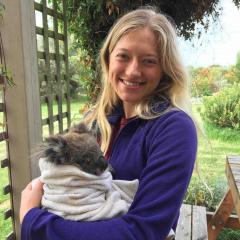Australia is facing enormous biodiversity and conservation challenges. On Wednesday 12 July 2023, the Centre for Biodiversity and Conservation Science (CBCS) was joined by over 170 friends and partners at Customs House in Brisbane to discuss “The Price of Neglect: Why It’s Time to Invest in Australia’s Biodiversity”. The event aimed to shed light on the importance of biodiversity conservation, emphasise the urgent need for investment to safeguard Australia’s natural heritage, and mobilise public support and enthusiasm for biodiversity conservation and sustainable practices.
Panel discussion
The event featured an insightful panel discussion, where CBCS experts and affiliates shared their knowledge and perspectives on the price of neglect. The panel comprised:
• Dr Laura Sonter, who leads UQ’s research on ecologically responsible mining
• Professor Hugh Possingham, currently a Chief Councillor with the Biodiversity Council and Chief Scientist of Accounting for Nature (and recently global Chief Scientist of The Nature Conservancy and Chief Scientist of Queensland)
• Associate Professor Justine Bell-James from UQ’s TC Beirne School of Law
• CBCS alumnus Dr Eddie Game, who is Lead Scientist and Director of Conservation at The Nature Conservancy Australia.
The panel discussion was facilitated by Tegan Taylor, a health and science reporter for the ABC and co-host of the ABC’s multi award-winning show Coronacast and Radio National’s Health Report.
So, what do our panellists think the price of neglect is? They emphasised that it extends far beyond monetary value, encompassing crucial aspects of our existence. From the vital ecosystem services that sustain life, including clean air and water quality, to the intangible yet invaluable aspects like culture – such as music inspired by bird songs, and the visual arts – our very way of life is intertwined with the health of our planet’s biodiversity. The panellists stressed that neglecting biodiversity threatens not only our own quality of life but also that of future generations, as the decline of species and ecosystems undermines the foundation of essential ecosystem services.
Amid the challenges we face, the panellists highlighted messages of hope and pathways forward, touching on everything from sustainable food production to minimising the impacts of mining required for sustainable energy on biodiversity to environmental policy reform. This year marks a critical juncture for environmental law as the Commonwealth EPBC Act (Australia’s main piece of legislation for environment protection) undergoes a major review. A startling statistic is that over 99% of projects engaging with the Act are approved, raising concerns about the effectiveness of environmental protection measures. This review presents a significant opportunity to strengthen the legal foundations of biodiversity protection, ensuring that future projects are scrutinised with utmost care to safeguard our natural heritage and secure a sustainable tomorrow.
Through collective effort and thoughtful reform, we can instil hope for a brighter and greener future for Australia and its diverse ecosystems. Years of campaigning for the government to better invest in biodiversity hasn’t improved the situation very much, so it’s time for conservation and industry to become allies. By fostering collaboration, we can harness the power of these sectors to work in harmony for the benefit of our planet.
Posters
Attendees of the event were impressed by the incredible research being carried out by CBCS PhD and early career researchers (ECRs), as showcased by Ilyas Nursamsi, Dr Chris O’Bryan, Dr Valerie Hagger, Shu Chen, Dr Nick Leseberg and Tin Buenafe.
• Ilyas studies land-use change and protected area effectiveness in Indonesia.
• Chris researches invasive species management and how governments can make better decisions to maximise cost-effectiveness to protect biodiversity and social values.
• Valerie researches coastal ecosystem conservation and restoration.
• Shu studies how private land conservation programs can be better communicated to engage private landholders effectively to conserve biodiversity on their lands.
• Nick looks at the conservation biogeography of night parrots.
• Tin studies how conservation practitioners can transition to more climate-smart spatial planning approaches.
These are just a few of the many examples of the incredible projects being undertaken by CBCS students and ECRs.
Organisers and support
The event wouldn’t have been possible without the hard work of so many members of the CBCS management committee and broader community, but especially Associate Professor Carissa Klein (project leader), PhD candidate Hannah Thomas, Dr Amelia Wenger, and Dr Brooke Williams, who make up the CBCS management committee engagement team, and Kate Donnelly who supported all aspects of running the event. We were also lucky enough to be supported by UQ’s Advancement team, with special thanks to Marlin Othman and Brenda Tournier, who made the event very smooth and successful.
We hope that while the event strengthened ties between CBCS and friends and colleagues, it also served as a catalyst for change, inspiring action and commitment to create a harmonious balance between human development and the protection of the natural world. This will be the first of hopefully a series of events aimed at strengthening ties between CBCS and industry and the wider community.
Hero image: Associate Professor Carissa Klein introducing the event. Image: Glenn Hunt
Image above: The panel at Customs House, left to right: Moderator Tegan Taylor, Dr Eddie Game, Dr Laura Sonter, Professor Hugh Possingham and Associate Professor Justine Bell-James. Image: Glenn Hunt


